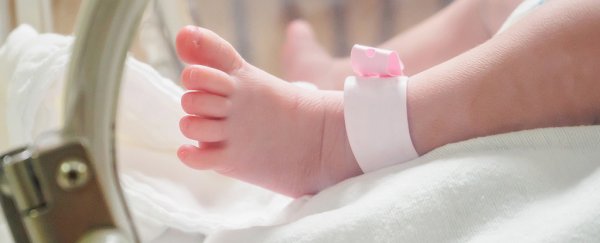A week before Christmas, a little Brazilian girl will be celebrating her first birthday. She doesn't know it yet, but her birth set a milestone in medical history, providing new opportunities for women who otherwise couldn't carry and deliver a child.
Uterine transplants from deceased donors have been attempted previously, but until last December no recipient had carried a child to term. Knowing it's feasible is sure to encourage further research to reduce the risks and provide hope for families.
The mother was a 32-year-old woman with Mayer-Rokitansky-Küster-Hauser (MRKH) syndrome – a condition that causes female sexual reproductive organs, such as the uterus and vagina, to be underdeveloped or absent at birth.
All that is known about her donor is that she was 45, had three successful vaginal deliveries, and had granted use of her organs prior to her death from brain haemorrhage.
On 15 December 2017, a baby girl weighing 2,550 grams (5.6 pounds) was delivered through Caesarean section. By all accounts she was all a family could hope for – a healthy and responsive child.
Four years ago, a 36-year-old Swedish woman also successfully delivered a healthy child using IVF via a womb provided by an unrelated benefactor.
In this case the 61 year old donor was alive and well at the time, generously giving up her uterus for the cutting-edge operation.
Procedures using organs from live donors have been attempted 39 times in the years since, so far resulting in a total of 11 live births.
Those odds will now doubt continue to improve with time, but given the scarcity of living donors in general, the number of people willing to give up their uterus while they're still kicking isn't exactly huge.
"The use of deceased donors could greatly broaden access to this treatment, and our results provide proof-of-concept for a new option for women with uterine infertility," says lead researcher Dani Ejzenberg from Faculdade de Medicina da Universidade de São Paulo.
"The numbers of people willing and committed to donate organs upon their own deaths are far larger than those of live donors, offering a much wider potential donor population."
In 2011, a 23-year-old woman who also had MRKH syndrome successfully fell pregnant using a womb from a deceased donor in Turkey.
Tragically, the pregnancy was determined to be unviable six weeks after conception and was terminated, calling into doubt whether uteruses provided by deceased donors could feasibly carry a new life completely through gestation.
Research has since continued, with informed volunteers still opting to go through the discomfort and potential trauma in the hopes of giving birth.
With this recent success comes not just the promise of greater access to donor organs, but vital information on what a transplanted uterus requires to successfully carry an embryo to full term.
It's likely a number of things could account for the team's success. But the researchers believe a key factor could have been the timing.
Five months before the transplant, the recipient had sixteen eggs from her own functional ovaries removed. Fifteen were fertilised, with 8 resulting in embryos that were subsequently preserved for later implantation.
The transplant took place in September of 2016. Seven months after the operation, with no indications of rejection or abnormalities, and menstruation appearing regular, the recipient received one of her embryos.
This implantation was months earlier than previous attempts, which received an embryo at least a full year after the transplant. The team had aimed for an even earlier date of just six months, but weren't satisfied with the thickness of the endometrium.
It's hard to say definitively whether this shorter wait time made a difference, but the courses of antirejection drugs and antibiotics potentially pose all sorts of complications for the body that just might sway the odds for a developing embryo.
Another factor the team considered crucial was the amount of time the uterus lacked oxygen. They discovered a uterus could still recover to function well after eight hours of being deprived of a fresh blood supply.
Knowing this could make all the difference not just when it comes to deceased donations, but live ones as well.
The donated uterus was removed during the delivery, as is typical for such transplants - this way the patient doesn't have to keep taking the medications needed to avoid rejection. But it also means it's unlikely this remarkable little girl will have biological siblings sharing her unique gestation in the future.
We wish her a happy first birthday. No doubt her family will be making it a very special one indeed.
This research was published in The Lancet.
